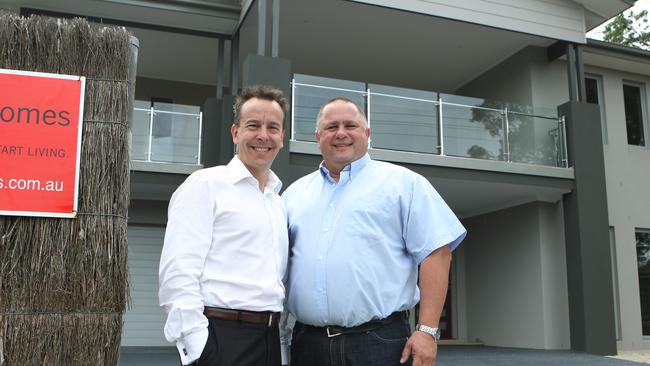Melbourne builder Hallbury Homes goes into voluntary administration
A 30-year-old luxury builder has hit the wall in a sign the industry is in for another rocky year.
A Melbourne builder operating for three decades has become the first major residential construction company to go into administration in 2023 as the sector braces itself for more pain.
Hallbury Homes appointed Menzies Advisory principal Michael Caspaney on Wednesday.
Mr Caspaney said there were 20 Hallbury staff affected and the company was operating on 42 sites with 50 projects, including dual occupancies, in Melbourne.
He said it was “early days” and he was in the process of gathering information but a major issue for Hallbury was the slow build speed for its projects.
“The directors believe the company is insolvent or will be insolvent in the near future,” Mr Caspaney said “At this stage all options are open but the facts will determine where everything will end up. There’s a process going on and everyone here is genuine about it and managing the process as best they can.”
Based in Langwarrin in Melbourne’s southeast, Hallbury is under the directorship of Glenn Nathan Smith and Clifford Anthony Hall. According to corporate filings, the company is currently owned by Boynis Pty and CHFT Pty Ltd which are respectively controlled by Mr Smith and Mr Hall. Mr Smith and Mr Hall did not return phone calls.

Hallbury’s move into voluntary administration continues a horror run for construction companies across Australia.
In the past 18 months sizeable builders including Privium, Probuild, Condev, Caydon Group, Next, Oracle Platinum Homes and Home Innovation Builders collapsed, impacting on billions of dollars of projects.
Mr Caspeny said Hallbury staff were told of the move into administration on Wednesday and there will be another meeting on Monday. He said Hallbury customers have contacted him seeking recommendations on builders to finish their homes.
“The industry is so stressed it’s different from the normal pre-Covid when the customers used to run off and have five different alternatives,” Mr Caspaney said.
“But my perception of the current situation is that all builders are under the same stress which is long build time and I am trying to collect a few names because customers are saying they need recommendations.”

Rain events, and labour and material shortages, have pushed residential build times to well over 12 months while it is typically between seven to nine months.
A wave of more than 5500 Australian companies hit the wall over the past year as many business owners succumbed to “sheer exhaustion”. The number of companies going into administration or liquidation topped 5560, according to Australian Securities and Investments Commission data. NSW accounted for roughly 40 per cent with 2177 companies going bust over the past 12 months. Victoria had 1236 insolvencies, followed by Queensland with 970, 432 in Western Australia and 225 in South Australia.
Revive Financial director Jarvis Archer said the Australian Taxation Office’s return to recovering tax debts after a two-year hiatus drove a lot of the increase in insolvencies. “Director warning letters and director penalty notices triggered company directors to deal with their hefty tax debts that accrued during the pandemic,” he said. “What we’re seeing from struggling business owners … is sheer exhaustion.”







To join the conversation, please log in. Don't have an account? Register
Join the conversation, you are commenting as Logout